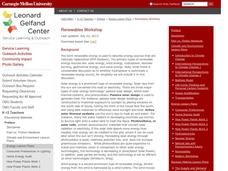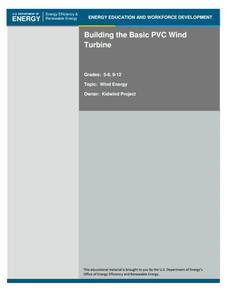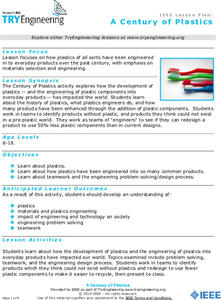Institute of Electrical and Electronics Engineers
Life Vest Challenge
After reading about the history and science of personal floatation devices, patents, and intellectual property, engineering teams design a life vest for a can of soup. To evaluate which groups considered the need for waterproofing, hold...
Institute of Electrical and Electronics Engineers
Be a Scanning Probe Microscope
Extensive reading is done in order to learn about scanning probe microscopy and nanoscale. Afterward, individuals use a pencil to probe an unidentified object that is inside of a box so that they cannot see it. Using only what they could...
Institute of Electrical and Electronics Engineers
Tennis Anyone?
After reading up on the history of sports racquets, engineering teams design and construct a racquet for batting a Velcro-striped ball at a target. Teams evaluate their design by aiming for the target three times each and answering...
Institute of Electrical and Electronics Engineers
Trebuchet Toss
Young engineers work in teams to design and build their own trebuchets according to certain criteria; they must be able to launch a mini marshmallow accurately into a pie tin. Background reading material, a planning sheet for trebuchet...
Institute of Electrical and Electronics Engineers
Keep it Cool
This cool lesson plan is ideal for elementary engineers or physical scientists, especially when learning about heat transfer and insulation. After reading a page of background information, engineering teams collaborate to design and...
Carnegie Mellon University
Consumer Preferences in Lighting
What is a watt? This tongue-twisting, mind-bending question and others are answered through this instructional activity on the different lighting options available. With the support of a PowerPoint, teach your physical science class...
Two Lives Left
Cargo-Bot
What would you think of an app that provides a creative introduction to an important 21st century skill, challenges learners at many levels, and is an addictively, fun game? Did we also mention it was free? We think you will find all...
Krzysztof Haft-Szatynski
Move the Turtle
Turtles are not known to be speedy movers, but have you ever tried to get them to move in a specific direction? How about getting them to move in a perfect circle? With this app, young computer programmers have to be on their toes to...
The Science Spot
Independent Investigation Guidelines
A neatly formatted outline of the steps of the scientific method can be used as a reference sheet for your future science fair participants. For each step, you will find a few guiding questions or points to remember when working on them.
Khan Academy
Project: Ad Design
Let your young programmers' creativity and programming knowledge shine with this culminating activity. Coders put together everything they know about using text commands, drawing, and animation to create a unique ad. This activity could...
Carnegie Mellon University
Renewables Workshop
Youngsters examine resource maps to find out which states are using solar and wind power and discuss as a class various other renewable energy sources. They use a provided data table to record pros and cons to each technology, build and...
Khan Academy
Welcome to the Computer Science Platform
You don't need to know how to code in order to teach your students! Show them learning is a lifelong skill by learning along with them. Take this activity for example; the code is on the left, and the result is on the right. Can you...
Institute of Electrical and Electronics Engineers
Build Your Own Robot Arm
Engineers team up to design and construct an 18-inch-long robotic arm that can successfully pick up a paper cup. Each group is given the exact same set of materials, but it is up to them to decide what to use and how to use it. It is a...
Institute of Electrical and Electronics Engineers
Cast Your Vote
In a simple but unique instructional activity, youngsters learn about the history of voting systems. They then collaborate in groups to develop a new honest and consistent voting method. A class-wide poll is taken, evaluating the designs...
NASA
Building for Hurricanes: Engineering Design Challenge
"By the hair on your chinny-chin-chin, I'll huff and I'll puff and I'll blow your house in," says the big, bad wolf! Engineering hopefuls are challenged to design and construct a hurricane-proof building from simple office and craft...
Institute of Electrical and Electronics Engineers
Making Sense of Sensors
Have small groups in your class construct working hygrometers as an example of the benefits of using sensors in engineering. This activity can be used during a weather unit when covering humidity or in a STEM activity as a preparation...
US Department of Energy
Building the Basic PVC Wind Turbine
Here is a comprehensive and well-written lesson plan that results in learners building a standard wind turbine. Once built, teens can design a variety of experiments to test different factors. This activity is a noble undertaking that...
Institute of Electrical and Electronics Engineers
Insulators and Conductors
In a classic activity, emerging electricians test various objects for electrical conductivity in a circuit. Each group constructs a simple circuit by following a diagram. Predictions are made and objects are inserted into the circuit,...
Institute of Electrical and Electronics Engineers
Adaptive Device Design
After reading about how engineering has made adaptive devices possible for people with disabilities, pupils work in groups to discuss different devices to determine whether or not they are adaptive. They also disassemble a pair of...
Institute of Electrical and Electronics Engineers
A Century of Plastics
After reading about polymer materials, engineer trainees examine how plastics have been integrated into everyday products. In groups, they compile a list of products made entirely without plastics and then, as a closing activity, try to...
Institute of Electrical and Electronics Engineers
Biomimicry in Engineering
Take a look with your class at how nature supplies inspiration to engineers. In cooperative groups, youngsters research biomimicry and then develop a system that would help support people living on the moon. Each team also considers...
Institute of Electrical and Electronics Engineers
Build a Big Wheel
What does it take to prepare for a construction project? In an engineering lesson plan, youngsters examine how a Ferris wheel can turn and carry a load without falling apart. After reading up on big wheel designs, they create a model...
Institute of Electrical and Electronics Engineers
Can You Canoe?
A neat handout immerses learners in the history of canoe making. After reading, small groups of mini engineers work to craft a canoe that will not be immersed! This is an ideal exercise in engineering design for your STEM curriculum or...
Institute of Electrical and Electronics Engineers
Water Fountain
Thorough instructions are given to guide you through making a demonstration hydraulic pump from two plastic soda bottles. After using the resource to teach your class about Pascal's and Bernoulli's principles, turn them loose in groups...














